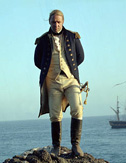
Movie Guru Rating:

Comment
on this review
| |

O'Brian on film is exciting but insufficient
by Zak Weisfeld
What strange forces control the geist of Hollywood? What conjunction of the planets could have led the industry to spend more than $300 million this year on pirate movies? Adding to the mystery are the titles of the two films—Pirates of the Caribbean: Curse of the Black Pearl and Master and Commander: Far Side of the World—each with enough words and punctuation to make one wonder whether they were budgeted by the keystroke. The topper, of course, is that they are two of the best big movies of the year.
Sadly, Master and Commander: Far Side of the World (hereinafter MC:FSW) is not the better of the two. Unlike Pirates which, it would be safe to say, elevated its source material, MC:FSW seems to have set sail with not much more than the dust-jackets of the 20-volume epic series on which it's based. Of course novelistic orthodoxy can as easily become an albatross around the neck of a film as mainsail. And certainly the perils of adaptation are much greater when the material is as fine and as fetishistically beloved as are Patrick O'Brian's Aubrey/Maturin series. But it can be done—as Lord of the Rings can attest. (In the interest of full disclosure, I must confess that I am currently in the middle of the 18th volume of the series, The Yellow Admiral, and proceeding, heart heavy with impending loss, toward the 20th.)
The most serious mistakes committed by MC:FSW are obvious from its title. By carving the bulk of the first movie out of the much-altered guts of the 10th book (Far Side of the World) and leavening it with incidents pulled from several other volumes, director Peter Weir has left MC:FSW feeling incomplete. It starts too abruptly to be the first in a series and ends too abruptly to satisfy as a stand-alone film.
In lieu of an introduction to the character of Jack Aubrey and his first meeting with the man who will become his best friend and ship's surgeon (not to mention spy) MC:FSW begins with a text that gives us the date, 1805, and establishes, in bold letters, the threat posed to England by the wicked tyrant, Napoleon Bonaparte. The next slate tells us that we are off the coast of Brazil and that the tiny ship we see below is the HMS Surprise, commanded by Captain Jack Aubrey. His orders are to seek and destroy the Acheron—a French frigate bent on ravaging the British whaling fleet in the Pacific.
And that's about it as far as scene setting goes. Within minutes the Surprise is beating to quarters and Russell Crowe, as the yellow-haired Capt. Jack Aubrey, is clapping on his cutlass. Without further ado, we are plunged into a naval battle of harrowing intensity. With luck and quick thinking the Surprise manages to survive the encounter, but the savage battering the ship and its sailors take is rendered with a brutal clarity that lets us know that Errol Flynn will not be joining us.
Battles at sea and obsessively accurate portrayals of shipboard life are not among MC:FSW's weaknesses. Every aspect of the Surprise, from the rigging to the hats, is rendered with a freakish accuracy that can only be viewed as a sop to O'Brian's novels and their delight in the minutia of shipboard life. The detail of life aboard the Surprise—the close darkness of the crew's quarters, the light and elegance of the Captain's, the food (complete with weevils), the sinister, mundane politics of the tiny floating city that is the Surprise—give the film a grounding that almost makes up for the tacked-together, disaster/battle/disaster picaresque of its plot.
The other thing holding MC:FSW together is Russell Crowe who is brilliantly cast as Capt. Jack. Crowe captures the mercurial captain's moods—his aggressiveness, his passion, his humor, and the melancholy that so often overwhelms him. In fact, Crowe's performance is so good it makes one wish that Weir had allowed more of the character's nuances and contradictions to seep into his screenplay. Jack's commitment to his duty, and his love of king and country are played entirely too straight.
But while Crowe is at least allowed to get the core of the character on the screen, Paul Bettany's Stephen Maturin must go down as the biggest disappointment of the film. The fault is only slightly Bettany's. He plays the doctor as a priggish landlubber, a whinging foil to Aubrey's heroic striding about. Far from Aubrey's equal, the movie Maturin is Tonto with an English accent and a cello. This is a shame. The binding element of O'Brian's series is the deep and unlikely friendship between these two very different men. Most of all though it is a friendship of equals—if not in status aboard ship then at least as men. Weir and company's dismissal of this element leaves me with grave doubts for the future of any Aubrey/Maturin franchise.
I wonder though whether those who haven't experienced the baffling perfection of O'Brian's books will be bothered by the liberties taken in MC:FSW. As a straightforward tale of adventure on the high seas it is a credible, if not excellent, movie. Perhaps it's best viewed as a companion to the series—an opportunity to hear what chain shot tearing through rigging sounds like, or to see the towering waves that roll beneath the Horn. Master and Commander: the Far Side of the World may not be an equal to the books, but it offers a few things to take with you as you sail through number 18, heading hard for number 20.

November 20, 2003 * Vol. 13, No. 47
© 2000 Metro Pulse
|





